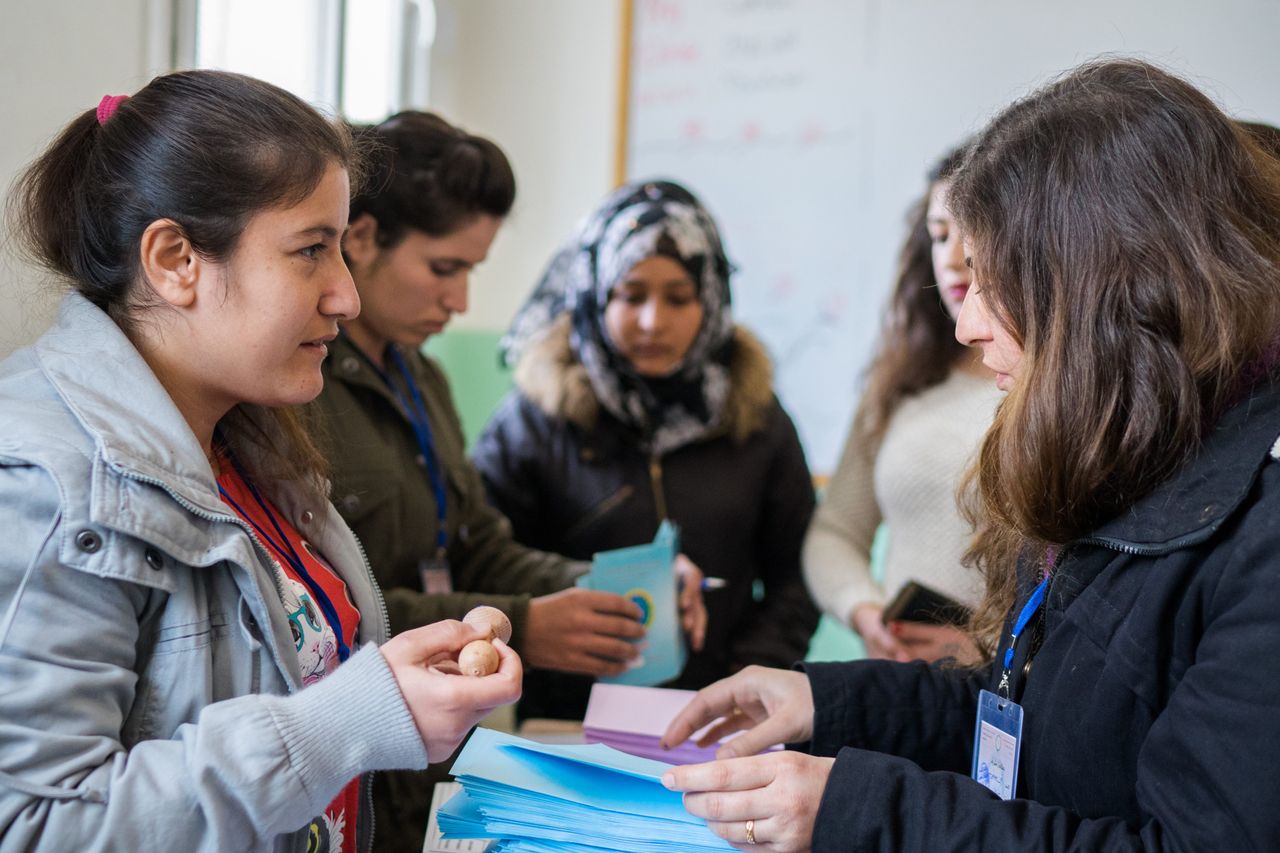
The local elections took place on December 1st, 2017 in northern Syria, where the Kurds constitute the majority. The Damascus-based regime does not recognize it.
The polling stations opened at 8 am. Two hours later, the ones in the center of Kobane were crammed with people of all ages, who sometimes brought along their whole families. The voters elected members of the councils for cities, precincts and the cantons of the so called Democratic Federation of Northern Syria, also known as Rojava . Ballots could be cast for independent candidates or for one of two parties: the National Democratic List (likely to win the election) or the Democratic Union Party in Syria.
Farida is 18, she voted for the first time. She is a doctor for the Kurdish Red Crescent (the equivalent of the Red Cross). She hopes that thanks to the election Kobane will develop faster.
Fawaz is 27. He is a computer scientist and came to the polling station with a friend.
“I want to cast my vote and, at the same time, show to the world that we need freedom and democracy”, she says.
For Fawaz it was the first time to vote, too.
“I couldn’t vote in the last election for private reasons. On the other hand, before the war , there was no point in voting because the elections were not fair”, he claims.
The Kurds often stress their pride in the electoral model they are building. It enforces that 50 percent of the council seats have to be filled by women. Moreover, 40 percent of the seats are allocated for the representatives of the ethnic, religious and cultural communities (as northern Syria is inhabited not only by the Kurds but also the Arabs, the Cherkess, the Assyrians, the Turkmen and others). The Sunni constitute the majority there but there also Yazidis or Christians.
Bozan Hami was observing the election in one of the polling stations in Kobane. He was designated by the local administration to monitor the electoral process.
“Compared to the election in September, this voting is better organized. Mainly due to the fact that there are more members of the electoral commissions. It used to be four, now it’s six. There are more observers, too”, explains Hami.
In order to avoid fraud, all voters receive a stamp on their voter cards. It is a special document with a photo and personal data that allows the citizens to take part in the election. The ballot is issued only after this document is presented, stamped and the voter puts a signature on a list. Additional security measures include dipping the voters’ fingers in ink which, claims Hami, is impossible to wash down for 24 hours after casting the ballot. There are also other ways to prevent voting violations. In order to make sure that candidates don’t come to electioneer, a delegated person is standing in front of the polling station trying to spot the candidates who may attempt that.
The elections took place but the results were not recognized by the regime in Damascus.
“The opposition did not do that either which is a mistake because without our voice it is difficult to talk about the future of Syria”, claims Shaheen el-Ali, the co-chairman of the High Electoral Commission in the Euphrates region.
He refers to the ongoing peace talks between the regime of President Bashar al-Assad and the opposition groups. The Kurds were not invited to the table, which sparked the biggest protest of Turkey, one of the three negotiating parties (apart from Russia and Iran).
The authorities of the so-called Federation of Northern Syria estimate that around 800,000 people took part in the local elections, which is 100,000 more than in the communal elections on September 22nd, 2017. This time there were 1303 election committees with 10,825 members in total.
This was the second out of three planned votes. As a result, representatives for all levels of government of the so-called Federation of Northern Syria are to be appointed. On September 22nd, 2017 the residents chose the representatives of the communes, which is the lowest administrative unit. In the third phase, due in January 2018, two hundred members of the People’s Congress of the Northern Syria will be elected.























